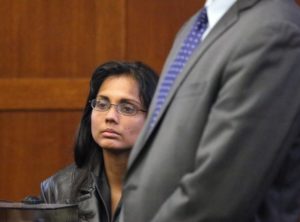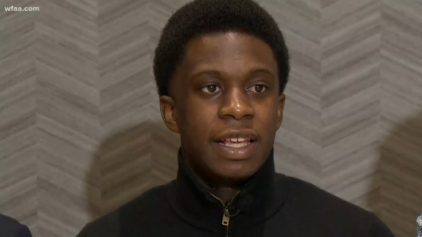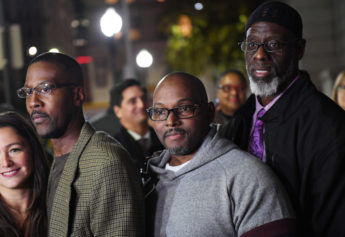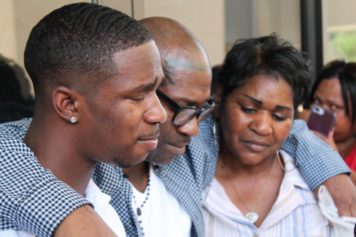
BOSTON – NOVEMBER 22: Annie Dookhan, former state chemist who mishandled drug evidence, entered a guilty plea during her court hearing at Suffolk Superior Court. (Photo by David L Ryan/The Boston Globe via Getty Images)
In what is being described as the largest single dismissal of wrongful criminal convictions in U.S. history, a Massachusetts court has dismissed over 21,000 drug-related cases after it was discovered that a state crime lab chemist falsified and fabricated evidence.
On April 19 in Boston, a state court judge vacated the convictions in the case of Bridgeman v. District Attorney for Suffolk County, which was filed by the ACLU of Massachusetts, the national ACLU, the state public defender’s office and law firm Fick & Marx LLP.
The drug convictions — which spanned the seven counties of Suffolk, Essex, Bristol, Middlesex, Plymouth, Norfolk and Cape & Islands — had relied on the doctored lab results of Annie Dookhan, whose misdeeds came to light in 2012 after she forged a colleague’s initials. The employee with the state Department of Public Health had lied about having a master’s degree, declared untested drug samples as positive and otherwise committed massive fraud in order to advance her career and build a reputation as an expert witness in drug trials.
In 2013, she pleaded guilty to 27 counts, including evidence tampering, perjury and obstruction of justice, and was sentenced to three to five years in prison, with two years of probation, according to The New York Times. She was recently paroled after serving three years, as UPI reported.
Dookhan’s work had impacted approximately 24,000 cases according to the ACLU of Massachusetts, with prosecutors moving to toss out 21,587 of the convictions. Out of 8,003 cases from Suffolk County, 7,886 were dismissed, as Masslive.com reported.
Jake Wark, press secretary for Suffolk County District Attorney Daniel F. Conley, told Atlanta Black Star that his office had learned of several cases in 2012 in which Dookhan had certified inert substances as illicit. “We immediately acted to terminate the prosecutions in those cases and, very fortunately, none was serving a sentence based solely on a Dookhan-related case,” Wark said. “Since that time, the appeals have been on procedural grounds, not factual ones. That is, the defendants didn’t claim to be innocent but rather claimed that they would not have pleaded guilty or, in a smaller number of cases, could have obtained a more favorable trial verdict, had Dookhan’s misconduct been known at the time of adjudication.”
The court ordered prosecutors to list the convictions they would move to dismiss and those cases they would choose to relitigate. Court documents acknowledged the “continuing adverse consequences of these convictions” on the wrongfully condemned, and the burden of these cases have imposed on the criminal justice system. “District Attorney Conley made the decision to focus only on the most serious convictions involving high-level or violent offenders,” Wark said. “So, while the re-tested drugs, scales, baggies, cutting agents, ledgers, phone records, surveillance video, independent witness statements and other evidence were likely still available and admissible in thousands of the lower-level cases, he moved to dismiss them and concentrate on the most serious 117 — about 1.5 percent of the total.”
Carl Williams, staff attorney for the ACLU of Massachusetts, said his organization faced resistance and had to sue the district attorney’s office to bring about the thousands of dismissals. He stated in a phone interview that this, “the largest dismissal of criminal cases based on a single court filing in history,” is part of a systemic problem involving prosecutors, defense attorneys, judges and jailers.
“This is the war on drugs,” Williams said of the larger implications of Dookhan. “Over 24,000 cases from eight years, and they called her superwoman because she was doing the bidding of the system of mass incarceration and the war on drugs. If it were anything else, if it were for rich people, for white people, this would not be allowed to stand” he added. “With the war on drugs, it is inevitable that you will have scandals involving injustice.”
The ACLU attorney also noted that 60 percent of these cases involved the criminalization of drug users. “That doesn’t help anyone who is struggling with drug addiction,” Williams said. “Some of these people who use drugs are in the juvenile system. It masks that we are dealing with children, they were children who possessed drugs,” he added, offering that these people did not commit a crime. “We are addicted to the idea that we can put people in jail and they will stop doing drugs. That is outrageous, because in jail, every form of drug is available. It is a public health situation, not a criminal incarceration situation.”
These wrongful convictions in the name of the war on drugs have taken their toll, the ACLU says, particularly among poor, Black and brown communities. People have lost their homes, their livelihoods, and, in some cases, have been deported from the country.
One of the Dookhan defendants, Kevin Bridgeman, is disabled and collects Social Security disability benefits. Bridgeman, who is a long-term volunteer at a nonprofit organization supporting the formerly incarcerated, pleaded guilty in 2005 and 2008 to cocaine possession and distribution charges, and in each case was sentenced to several years in prison. In both cases, he waived his right to a jury trial, but, had he known of Dookhan’s misconduct, would have gone to trial or sought different plea agreements.
“I am concerned that if I withdraw my guilty plea or otherwise vacate my conviction on the basis of Ms. Dookhan’s misconduct, I could be prosecuted for the serious charges which the Commonwealth moved to dismiss and be sentenced to a longer prison term,” Bridgeman, who is now free, said in an affidavit.
In 2009, another defendant, Miguel Cuevas, was sentenced to four-and-a-half to five years in prison for heroin and cocaine distribution, and after his release, worked at a department store and became active in the community. Similarly, in 2005, Yasir Creach was sentenced to a year in prison for cocaine possession, based on drug certificates signed by Dookhan reporting the samples in his case tested positive for cocaine. Creach said that had he known about Dookhan’s fraudulent actions, he would have negotiated a better plea deal with his lawyer.
These recent dismissals have implications for another ongoing case of a state crime lab chemist in Western Massachusetts. A report from the Massachusetts Attorney General released last May found that for eight years, chemist Sonja Farak was high on drugs nearly every day she came to work at the state drug lab in Amherst. Farak, who was arrested in 2013 and sentenced in 2014, abused cocaine, LSD and methamphetamines, stole the drugs from the lab and manufactured crack herself with the use of lab supplies.
The events in Massachusetts come as President Trump seeks to ramp up the war on drugs in poor Black communities, even as his administration responds to the predominantly white issue of opioid addiction as a crisis in need of treatment. U.S. Attorney General Jeff Sessions has eliminated a Department of Justice forensic science commission that ensures innocent people are not imprisoned.
“Jeff Sessions has made direct statements about the ACLU and said it is one of the biggest threats to civil rights in the United States, which is fascinating,” Carl Williams of the ACLU said, noting that Sessions has a long career of opposing civil rights and engaging in dog-whistle politics, including appeals to white supremacists. The federal government’s top prosecutor, Williams said, “is thrilled about marijuana possession laws.” When it comes to drug legalization and decriminalization, Williams believes Sessions is “a dinosaur of another age that is trying to hold on to the last grasps of the antebellum South.”
The solution to ending the war on drugs and policies that ensnare the community, according to Williams, is up to those people affected. “It isn’t about them. It is about us. Under Reagan, when people started to deal with the AIDS crisis, people fought like hell and saved millions of people’s lives,” Williams said. “Reagan was dead set against it and would not mention AIDS. I think very much the same way, the ball is in our court. We can organize. We can get people who are affected by these policies. We can fight against it, and every time, we will win,” he added, noting that we challenged slavery in this country.
“History is not on their side,” Williams said of the proponents of the drug war. “We have a legacy of Black women, especially, and Black people. We can look back at the brave, dramatic and victorious struggle of freedom that our people fought and won.
“We owe it to them. It is in our souls,” he said. “There is a reason we’re here.”


